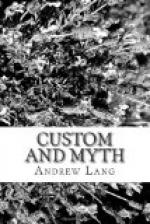In a discussion about origins, and about the corruption of religion, it would have been well to account for institutions and beliefs almost universally distributed. We know, what De Brosses did not, that zoolatry is inextricably blent with laws and customs which surely must be early, if not primitive, because they make the working faith of societies in which male descent and the modern family are not yet established. Anyone who wishes to show that this sort of society is a late corruption, not an early stage in evolution towards better things, has a difficult task before him, which, however, he must undertake, before he can prove zoolatry to be a corruption of religion.
As to the worship of ancestral and embodied human spirits, which (it has been so plausibly argued) is the first moment in religion, Mr. Max Muller dismisses it, here, in eleven lines and a half. An isolated but important allusion at the close of his lectures will be noticed in its place.
The end of the polemic against the primitiveness of fetichism deals with the question, ‘Whence comes the supernatural predicate of the fetich?’ If a negro tells us his fetich is a god, whence got he the idea of ‘god’? Many obvious answers occur. Mr. Muller says, speaking of the Indians (p. 205): ’The concept of gods was no doubt growing up while men were assuming a more and more definite attitude towards these semi-tangible and intangible objects’—trees, rivers, hills, the sky, the sun, and so on, which he thinks suggested and developed, by aid of a kind of awe, the religious feeling of the infinite. We too would say that, among people who adore fetiches and ghosts, the concept of gods no doubt silently grew up, as men assumed a more and more definite attitude towards the tangible and intangible objects they held sacred. Again, negroes have had the idea of god imported among them by Christians and Islamites, so that, even if they did not climb (as De Brosses grants that many of them do) to purer religious ideas unaided, these ideas are now familiar to them, and may well be used by them, when they have to explain a fetich to a European. Mr. Max Muller explains the origin of religion by a term (’the Infinite ’) which, he admits, the early people would not have comprehended. The negro, if he tells a white man that a fetich is a god, transposes terms in the same unscientific way. Mr. Muller asks, ’How do these people, when they have picked up their stone or their shell, pick up, at the same time, the concepts of a supernatural power, of spirit, of god, and of worship paid to some unseen being?’ But who says that men picked up these ideas at the same time? These ideas were evolved by a long, slow, complicated process. It is not at all impossible that the idea of a kind of ‘luck’ attached to this or that object, was evolved by dint of meditating on a mere series of lucky accidents. Such or such a man, having found such an object, succeeded in hunting, fishing,




